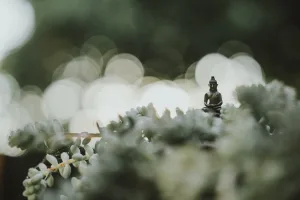Have you ever wondered if Zen gardens hold any Feng Shui benefits? This article aims to explore the potential benefits that Zen gardens can bring to your home and wellbeing. From creating a peaceful and harmonious environment to promoting relaxation and stress relief, discover how these Zen-inspired landscapes can enhance the energy flow in your space and bring about a sense of tranquility and balance. So, if you’re curious about whether incorporating a Zen garden into your life can positively impact your Feng Shui, read on to find out more.

Understanding Zen Gardens
Origins of Zen Gardens
Zen gardens, also known as Japanese rock gardens or dry landscapes, trace their roots back to ancient Japan. They emerged during the 6th century as an integral part of Buddhist temple grounds. Influenced by Chinese philosophies, Zen gardens were initially created to facilitate meditation and reflection. They were designed to cultivate a sense of tranquility and harmony, providing a sanctuary for spiritual practice.
The Aesthetic and Philosophical Elements of Zen Gardens
Zen gardens embody simplicity, elegance, and a deep appreciation for nature. They are meticulously crafted landscapes, carefully composed with minimalistic features. The main aim is to create a space that promotes a meditative state, allowing individuals to align with the present moment and experience a sense of serenity.
Rooted in Zen Buddhism, these gardens are steeped in philosophical elements. They reflect the principles of impermanence, balance, and the interconnectedness of all things. Each element within the garden is intentionally placed to evoke a specific emotion or capture a particular aspect of nature.
Components of Zen Gardens
Zen gardens typically consist of several key components that work together harmoniously. These components include rocks, gravel or sand, water features, and carefully selected plants. Each element is deliberately arranged to create a visually appealing and contemplative space.
The rocks in Zen gardens serve as the focal point, representing mountains or islands in the vast sea. The gravel or sand is raked in patterns that mimic the flow of water or waves, providing a sense of movement and tranquility. Water features such as ponds or small streams bring a soothing and reflective quality to the garden. Lastly, carefully chosen plants, such as mosses or bamboo, add a touch of greenery and bring life to the otherwise minimalist landscape.
Concept of Feng Shui
Origins of Feng Shui
Feng Shui, an ancient Chinese art and science, dates back over 3,000 years. It originated in ancient China and has since spread throughout Asia and the rest of the world. Feng Shui, which means “wind and water” in Chinese, is based on the belief that the arrangement and orientation of objects can affect the flow of energy, or “chi” (also known as “qi”), in a space. It aims to harmonize individuals with their environment and promote well-being.
Principles of Feng Shui
Feng Shui revolves around several key principles. These principles include the interaction between the five elements (wood, fire, earth, metal, and water), the Bagua (an eight-sided energy map representing different aspects of life), the yin and yang balance, and the concept of energy flow.
Central to Feng Shui is the idea that the energy in a space should flow freely and harmoniously. By incorporating various techniques and elements, such as color, lighting, and furniture placement, Feng Shui aims to create a balanced and harmonious environment that supports well-being, prosperity, and happiness.
Feng Shui and Interior Design
Feng Shui principles can be applied to various aspects of interior design. From the layout of furniture to the choice of colors, each decision can influence the energy flow within a space. By following Feng Shui guidelines, individuals can create a harmonious and balanced environment that promotes positive energy and well-being.
The Intersection of Zen Gardens and Feng Shui
How Zen Gardens Incorporate Feng Shui Principles
Zen gardens and Feng Shui share a common objective – creating a harmonious and balanced environment. Both practices are deeply rooted in the connection between the natural and spiritual world. While Zen gardens focus on contemplative spaces and meditation, Feng Shui aims to balance the flow of energy within a space. When combined, these two practices enhance the overall benefits of each other.
Zen gardens incorporate Feng Shui principles through careful placement of elements. The arrangement of rocks, plants, and water features follows the principles of energy flow and balance. By incorporating Feng Shui techniques, Zen gardens become more than just aesthetically pleasing landscapes; they become spaces that promote positive energy and tranquility.
Common Themes in Zen Gardens and Feng Shui
Zen gardens and Feng Shui both emphasize the importance of nature and its elements. Both practices value simplicity, minimalism, and the creation of a peaceful atmosphere. They intuitively recognize the power of the environment to shape our well-being and state of mind.
The concepts of balance, harmony, and alignment are central to both Zen gardens and Feng Shui. Each element within the garden is intentionally placed to create a balanced and harmonious whole. The combination of rocks, gravel, water features, and plants in Zen gardens follows the principles of Feng Shui to maximize positive energy flow.
Role of Energy (Chi/Qi) in Both Concepts
Energy, known as “chi” or “qi,” plays a significant role in both Zen gardens and Feng Shui. In Zen gardens, the arrangement of elements and the overall design aim to create a sense of tranquility and promote the flow of positive energy. Feng Shui principles similarly focus on the balance and flow of energy within a space.
Both practices acknowledge the effect that energy has on our well-being. By creating an environment that supports the optimal flow of energy, individuals can experience a greater sense of harmony, peace, and balance. The combination of Zen gardens and Feng Shui enhances the energy flow within a space, amplifying the benefits of both practices.
Feng Shui Advantages of Xinjing within Zen Gardens
Concept of Xinjing in Zen Gardens
Xinjing, meaning “heart mirror” in Chinese, refers to a state of clarity and inner peace. In Zen gardens, the concept of Xinjing is embodied through the careful arrangement of elements. The simplicity and minimalism of the garden allow individuals to clear their minds and cultivate a sense of tranquility.
Role of Xinjing in Creating Balance and Harmony
Xinjing plays a crucial role in creating balance and harmony within a Zen garden. By quieting the mind and focusing on the present moment, individuals can better connect with the natural elements surrounding them. This connection promotes a sense of oneness and aligns with the principles of Zen and Feng Shui.
Xinjing’s Effect on Energy Flow
Xinjing, as a state of inner peace and clarity, positively affects the energy flow within a Zen garden. When individuals are in a state of Xinjing, the energy they emit becomes more harmonious and balanced. This energy then interacts with the environment, creating a harmonious energetic exchange. The combination of Xinjing and the principles of Feng Shui enhances the overall flow of energy, further promoting balance and well-being.

Benefits of Water Elements in Zen Gardens
Importance of Water in Feng Shui
In Feng Shui, water is considered a symbol of wealth, prosperity, and abundance. It is believed to attract positive energy and enhance the flow of chi. Incorporating water elements within a space can have a profound impact on the overall energy and well-being.
How Zen Gardens Use Water Features
Zen gardens often incorporate water features, such as small ponds or delicate waterfalls, to create a tranquil and reflective atmosphere. The sound of running water brings a soothing quality to the garden, promoting relaxation and harmony. The presence of water in a Zen garden amplifies its Feng Shui benefits, attracting positive energy and enhancing the overall energetic balance.
Feng Shui Benefits of Water Features in Zen Gardens
Water features in Zen gardens enhance the flow of energy and support the principles of Feng Shui. The gentle movement of water creates a sense of serenity and tranquility, helping individuals connect with their surroundings on a deeper level. Water elements also attract positive energy and promote abundance and prosperity. By incorporating water features, Zen gardens become spaces that not only promote meditation and reflection but also invite harmony, balance, and prosperity.
Rock Formations and Feng Shui
Symbolism of Rocks in Zen Gardens
Rocks hold significant symbolic meaning in Zen gardens. They represent stability, strength, and the enduring presence of nature. The carefully chosen and arranged rocks contribute to the overall aesthetic and embody the essence of mountains or islands in the garden.
Application of Rock Formations in Feng Shui
In Feng Shui, rocks are often used strategically to create a sense of grounding and stability. By placing rocks in specific areas, the energy within a space can be anchored and balanced. The shapes, sizes, and positioning of rocks can influence the flow of energy, diverting it in a harmonious direction.
Feng Shui Advantages of Incorporating Rock Elements in Zen Gardens
Incorporating rock elements in Zen gardens enhances their Feng Shui benefits. The symbolic presence of rocks adds a grounded and stable energy to the garden. The intentional arrangement of rocks promotes a harmonious flow of energy and balances the overall energetic composition. By carefully selecting and arranging rocks, Zen gardens become spaces that support stability, grounding, and a harmonious energetic environment.

Sand or Gravel as a Representation of Natural Phenomenon
Sand or Gravel Use in Zen Gardens
Sand or gravel serves as an essential element in Zen gardens. It is raked into patterns that mimic natural phenomena such as water ripples, ocean waves, or wind-blown patterns in sand dunes. The patterns evoke a sense of movement, creating a dynamic and ever-changing landscape.
Natural Phenomenon Representation and its Feng Shui Significance
The representation of natural phenomena through sand or gravel patterns holds significant Feng Shui symbolism. Patterns mimicking water ripples or waves attract abundance, prosperity, and the flow of positive energy. Sand patterns that resemble wind-blown patterns in sand dunes bring a sense of freedom, creativity, and openness.
Energizing Your Space with Sand or Gravel
By incorporating sand or gravel patterns in Zen gardens, individuals can energetically activate their space. The intentional arrangement of patterns facilitates the flow of chi, attracting desirable energy and enhancing the overall Feng Shui benefits. Sand or gravel becomes not only a visual representation of natural phenomena but also a powerful tool in creating a harmonious and energetically charged environment.
Plants and Their Feng Shui Significance
Role of Plants in Zen Gardens
Plants play a crucial role in Zen gardens, adding a touch of greenery and connecting the garden with the natural world. They bring life, vitality, and a sense of freshness to the otherwise minimalistic landscape. Specifically chosen plants such as mosses, bamboo, or bonsai trees are often incorporated to further enhance the overall aesthetic and symbolism.
Feng Shui Symbolism of Different Plants
In Feng Shui, different plants carry distinct symbolic meanings and energies. For example, bamboo is often associated with growth, flexibility, and resilience. Orchids represent beauty, elegance, and abundance. By strategically selecting and placing specific plants within a Zen garden, individuals can amplify the desired Feng Shui qualities and energies.
How Placements of Plants Affect Feng Shui in Zen Gardens
The placement of plants within a Zen garden can greatly influence the flow of energy and overall Feng Shui balance. Individual plants can be positioned to attract or deflect energy, depending on their specific symbolic meanings. By harmoniously arranging plants in accordance with Feng Shui principles, Zen gardens become spaces that not only promote tranquility and contemplation but also harness and amplify desired energies.
Role of Zen Garden Ornaments in Feng Shui
Types of Ornaments in Zen Gardens
Zen gardens often incorporate various ornaments and sculptures to add visual interest and enhance the overall aesthetic. These ornaments can include stone lanterns, pagodas, statues, or symbolic representations of animals or deities. Each ornament is selected and placed with thoughtfulness and intention.
Feng Shui Meanings of Different Ornaments
Each ornament within a Zen garden holds specific Feng Shui symbolism and meaning. Stone lanterns, for example, represent enlightenment and spiritual guidance. Pagodas symbolize spiritual or cosmic connections. By understanding and strategically placing these ornaments, individuals can amplify the desired Feng Shui qualities and energies within their Zen gardens.
Placement and Arrangement of Ornaments
The placement and arrangement of ornaments within a Zen garden are crucial in Feng Shui practice. Ornament positioning should align with the principles of energy flow and balance. The strategic placement of ornaments can help guide energy, harmonize the overall energetic composition, and enhance the desired Feng Shui qualities and influences within the garden.
Overall Feng Shui Benefits of Zen Gardens
Enrichment of Positive Energy
The combination of Zen gardens and Feng Shui principles creates an environment rich in positive energy. The carefully selected elements, intentional arrangements, and overall harmonious design enhance the flow of energy, promoting well-being, and a sense of tranquility. Zen gardens become spaces that cultivate and amplify positive energy, benefiting individuals who engage with them.
Promotion of Balance and Harmony
Zen gardens, with their minimalist design and integration of Feng Shui principles, promote balance and harmony. The intentional placement of elements, such as rocks, water features, and plants, creates a balanced and visually appealing landscape. When combined with the principles of Feng Shui, Zen gardens become spaces that support energetic balance and harmony within the environment.
Creation of a Relaxing and Centered Environment
The combination of Zen gardens and Feng Shui principles creates an environment that is optimal for relaxation and centering. The serene nature of Zen gardens, combined with the intentional arrangement of elements and the promotion of positive energy flow, supports individuals in finding peace and tranquility. Zen gardens become sanctuaries, inviting individuals to connect with their inner selves and escape the stress and demands of daily life.
In conclusion, Zen gardens undeniably possess significant Feng Shui benefits. Their careful design, intentional arrangements, and incorporation of natural elements align with the principles of Feng Shui, creating environments that promote positive energy, balance, and well-being. By integrating Feng Shui principles into Zen gardens, individuals can cultivate spaces that not only inspire contemplation and meditation but also enhance the overall energetics, creating tranquil and harmonious environments in which to thrive.




